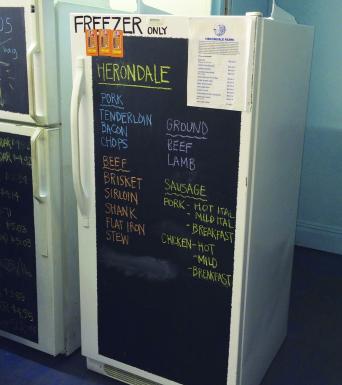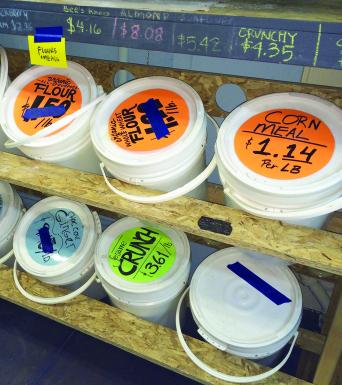
Another Co-op Grows in Brooklyn: Lessons Learned From Lefferts
Anyone looking for a peek into the birthing of a cooperative grocery might want to make a pilgrimage to Lefferts Community Food Co-op in Brooklyn. Lefferts, open since December 2014, takes up 1,000 square feet, 75 percent of which is retail space. The co-op, named for Lefferts Gardens, the neighborhood, (or sub-neighborhood) where it’s located bordering Prospect Park, is open twice a week and uses household-quality refrigerators with chalkboards attached to let shoppers know what’s inside. The packaged grocery inventory occupies four four-shelf metal bakers’ racks and three six-shelf metal bookcases.
A smattering of Lefferts’ all-volunteer staff welcomed a small group, including four members of Weavers Way, to the store last month as part of the spring Mid-Atlantic Food Cooperative Alliance meeting. MAFCA is an affiliation of food co-ops, buying clubs and startups in six states — Delaware, Maryland, New Jersey, New York, Pennsylvania and Virginia. It seeks to grow the cooperative economy, educate people about co-ops and help build a sustainable and equitable system for producing, distributing and consuming healthy, local food.
Karen Oh, Lefferts board member and co-founder, said the co-op was started to satisfy the basic cooking needs of the community. Their stock started out with staples like rice, beans, flour and sugar, and has built up from there.
“We weren’t set up to open a health-food store,” Oh said. “We wanted to provide high-quality food for as cheap a price as possible.”
Lefferts grew out of a CSA that Oh and another resident had been running for nine years. “Working at Park Slope Food Co-op” — the big dog of Brooklyn co-ops — “where I’m a member, just made me realize we could probably do this as a community, versus waiting for a private entrepreneur to open up a fancy food store,” Oh said.
Lefferts’ membership now stands at 230, about half of which is active. Sales average $2,000 a week.
“[Spending’s] really limited by our inventory,” Oh said. “I feel like when people come in, including myself, they want to spend more money, but because we don’t have the capital to get the influx of extra inventory, they’re really kind of capped at what they can get.”
Expanding their range of fresh inventory is also a challenge. The bulk of Lefferts’ produce now comes from Lancaster Farm Fresh of Leola, Pa. “It seems like vegetables and citrus are our most challenging things, because our vendors are regional, and so it’s like we’re never getting a banana in here,” Oh said.
In the last year, Oh and the other cooperators have learned how difficult it can be to get committees to work together. “For example, we’re planning this shift from Island Natural to UNFI,” both grocery distributors. “And the logistics of having four different committees that need to be involved in that . . . is like an epic communication battle.”
Thanks to a loan program for new food co-ops sponsored by Park Slope, Lefferts plans to double its inventory and get commercial refrigeration. They’re also hoping to open for a third day during the week.
Oh has given a lot of her time over the years to the building up of Lefferts, but she’d like to take a few steps back at some point. To that end, she hopes the co-op’s committees will eventually feel empowered to make their own decisions.
“The more people making decisions, as long as we can figure out a good way to communicate it, as long as it’s not disastrous to the co-op and the board doesn’t feel like it is, that’s worth a discussion,” she said.

